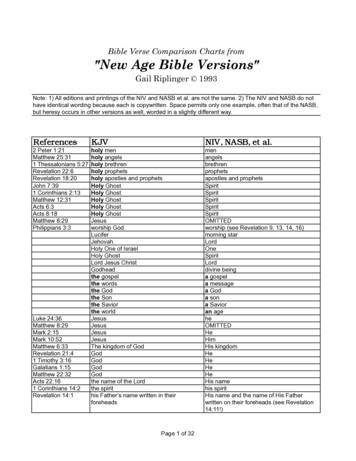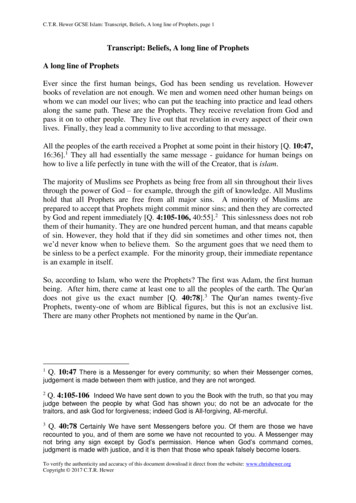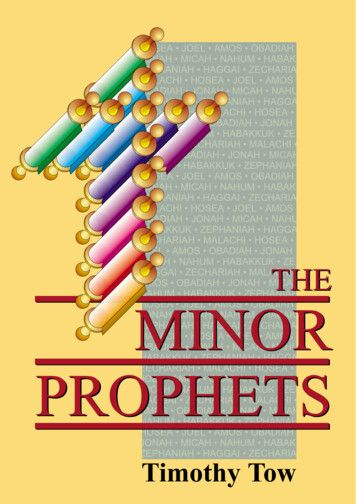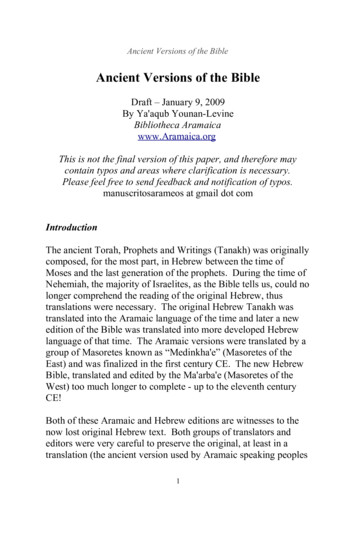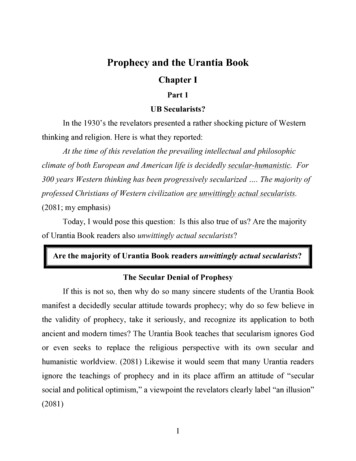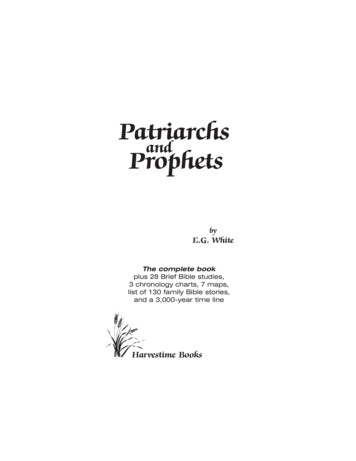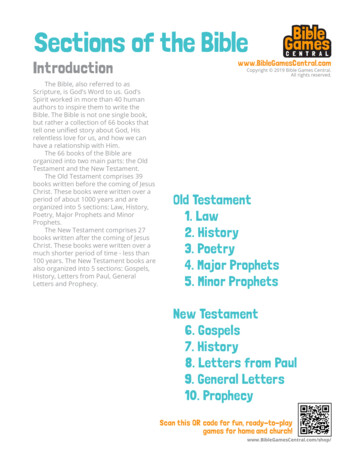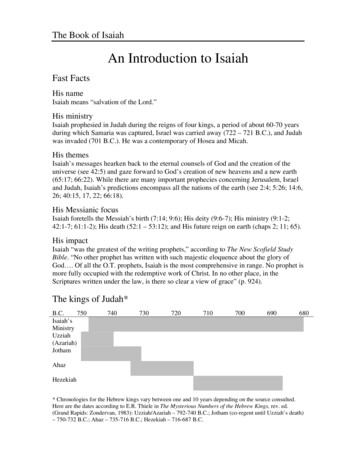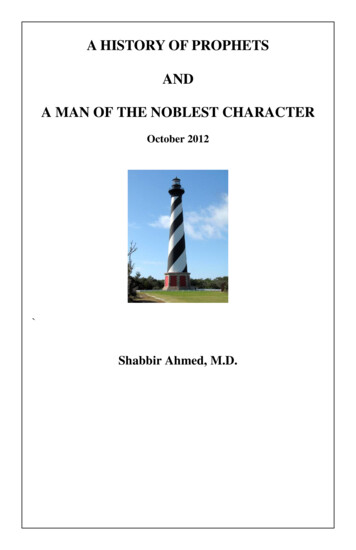
Transcription
A HISTORY OF PROPHETSANDA MAN OF THE NOBLEST CHARACTEROctober 2012 Shabbir Ahmed, M.D.
www.ourbeacon.comwww.DrShabbir.comE-mail: drshabbir@bellsouth.netA HISTORY OF PROPHETSShabbir Ahmed, M.D.Editor: Saleena Karim, UKOverview: Iftikhar Ahmad, PhD, North CarolinaFirst published 2012Copyright 2012 Shabbir Ahmed, M.D.All rights reserved. Printed in the USA. No part of this publication maybe reproduced, stored in a retrieval system, or transmitted, in any formor by any means, electronic, mechanical, photocopying, recording, orotherwise, without the prior written permission of the author, except inthe case of reviewers who may quote brief passages in a review.ISBN-13: 978-1470018863ISBN-10: 1470018861www.OurBeacon.com , www.DrShabbir.comPh: 954-746-21156440 NW 53 STLauderhill, FL 33319ii
Editor’s Note:The first edition of this title, written by the renowned scholar of Islam,Dr. Shabbir Ahmed, is being released in October 2012. I feel privileged tobe a part of this project, in editing this unique book.Dr. Ahmed is a prolific writer. He has penned very diverse titles onIslam, Religions, History, Philosophy, Humor and Poetry. He is able todeal with the most difficult of subjects with courage, truth andsensitivity. Dr. Ahmed has beautifully translated the Qur’an into twolanguages: English and Urdu, and written a marvelous critique on theKing James Version of the Bible. He has much to offer readers throughhis writings, even as he humbly refers to himself as a mere student.His is an example to be followed, both as a writer and as a wonderfulhuman being.*Some readers might prefer to start reading this book from Chapter 27b:“A Man Of The Noblest Character”.Saleena Karim,12 September 2012iii
TABLE OF CONTENTSEditor’s Note: . iiiTable of Contents . ivIntroduction . vChapter – 1 Rise and Fall of Nations . 1Chapter – 2 The Chain of Prophets . 4Chapter – 3 Prophet Adam (Aadam). 7Chapter – 4 Prophet Enoch (Idrees) . 11Chapter – 5 Prophet Noah (Nuh) . 12Chapter – 6 Prophet Eber (Hud) . 19Chapter – 7 Prophet Saleh. 26Chapter – 8 Prophet Abraham (Ibrahim) . 33Chapter – 9 Prophet Lot (Lut) . 48Chapter – 10 Prophet Ishmael (Ismail) . 52Chapter – 11 Prophet Isaac (Ishaq) . 56Chapter – 12 Prophet Jacob (Ya’qoob) . 57Chapter – 13 Prophet Joseph (Yusuf) . 59Chapter – 14 Prophet Jethro (Sho’aib) . 67Chapter – 15 Prophet Moses (Musa). 74Chapter – 16 Prophet Aaron (Haroon) . 100Chapter – 17 Prophet Job (Ayub) . 104Chapter – 18 Prophet Ezekiel (Zal-Kifl) . 106Chapter – 19 Prophet David (Daud) . 107Chapter – 20 Prophet Solomon (Sulaiman) . 110Chapter – 21 Prophet Elijah (Elias) . 117Chapter – 22 Prophet Elisha (Al-Yasa’) . 118Chapter – 23 Prophet Jonah (Yunus) . 119Chapter – 24 Prophet Zachariah (Zakariya) . 121Chapter – 25 John the Baptist (Prophet Yahya) . 123Chapter – 26 Prophet Jesus (‘Isa) . 125Chapter – 27a Prophet Muhammad . 134Chapter – 27b A Man of the Noblest Character:. 135Chapter – 27c Why Should We Know Muhammad? . 167iv
INTRODUCTIONDuring the last millennium, many scholars have authored stories ofProphets under various captions but, unfortunately, they are morefiction than fact. I am not aware of any history book primarily based onthe Authentic Qur’an.The most popular of these conjecture-based books has been the Arabic"Qasas-ul-Anbia" (Stories of the Prophets) authored by Imam ImaduddinAbul-Fida Hafiz Ismail Ibn Kathir (d.1372 CE). These works are hugevolumes comprising of fanciful ideas, very questionable Ahadith(Prophetic traditions), irrationalities and outright fabrications. Theauthors seldom quote their sources of information. The books havealmost nothing to do with the authoritative Qur'an. I read some of thesebooks in my teens and again many years later. They are only a few of thenumerous books that thankfully kept me away from the fictitious,counterfeit, “Imamist” Mullah-made N2I – The Number Two Islam.It is amazing to see that the Glorious Qur’an (610-632) is the first everbook in the world that deals with THE PHILOSOPHY OF HISTORY. Itnarrates the most authentic histories of Prophets and their peoples. Mosthistory books would only give us the dates and events about a nationand shy away from analyzing the reasons behind its rise and fall. TheQur’an does not narrate stories to us like grandma tales. It delves deepinto the virtues and vices that lead to their rise and fall. Thus, the storiesgiven in the Qur’an serve for us a definite purpose. They contain lessonsfor us, being applicable in all times since Divine laws never change.These immutable laws determine the fate of nations and make noexceptions.[The world had to wait 12 centuries before the German philosopherWilhelm Friedrich Hegel (d.1831) gave lectures on the subject whichwere later compiled in a book form titled The Philosophy of History.]God makes His laws in the “World of Command” as He wills, and Heimplements them in the “World of Creation” (The Universe. 7:54). Whata lesson it is for the entire human race! The infallible revelation of Godlets humans choose their actions, and thus, determine their destinies. Itv
tells people clearly the ways to rise as honorable people. It also warnsthem against what brings about their decline and downfall.Notes: Please remember that the verses of the Qur’an have beenpresented randomly in this book. However, at the end, the chronology ofevents aligns itself almost automatically in the mind.Secondly, as an example, 17:70, in this book, means Chapter-17, Verse-70of the Qur’an. As a token of respect, please add a.s. (‘alaiyihissalam’Salutes on him) after a Prophet’s name. The customary (S) after ProphetMuhammad’s name will denote the same. ‘Hazrat’ would denote‘Honorable’.What Made Me Write “A History of Prophets”This book will educate us on how the masses and the leaders mustconduct their affairs in order to build and sustain a great nation. Anyoneand any nation can learn from what is coming forth in the followingpages.It appears that all the moral vices that individually existed in thedeclining civilizations, are collectively inflicting the Muslims inparticular and the world in general. Can we learn any lessons?Most scholars of history and religion agree that the Qur’an is the onlyunadulterated Scripture we have today. A critical examination of historyand the internal evidence in various scriptures confirms this fact.vi
CHAPTER - 1RISE AND FALL OF NATIONSAs mentioned above, the Qur’an is the first ever book to deal with the‘Philosophy of History’. It makes things simple for us by pointing outcertain evils that were most prevalent in a given society, the Prophetassigned to them, his noble efforts to make reforms and the reaction ofhis people. Finally, it sums up the end results. This is how beautifullyand clearly the Qur’an explains for us the Laws of Rise & Fall of Nations.The Book narrates for us the stories of many Prophets and their people,but not for the sake of story-telling. It narrates them for us to drawlessons. This method is a highly effective tool for our understanding ofthe Divine Law of Requital on a national scale: “As you sow, so shall youreap.” In other words, the Qur’an explains for us the Law of Cause andEffect as it applies to nations. If a community defies Divine laws, it willdecline. On the other hand, if a community follows Divine laws, it willflourish. These laws never change and they apply to all nations at alltimes.Being the most pragmatic Book on earth, the Qur’an puts forth before usvery scientific principles to evaluate the truth versus conjecture, even tocheck the authenticity of the Glorious Book itself:1.2.3.4.5.Use of Intellect and Reason instead of blind acceptance of whatwe hear or see.Results achieved by various Systems in different humansocieties.An examination of the history of nations to determine thereasons behind their rise and fall.How the Prophets strove to reform their respective societiesunder Divine guidance.The definition of Truth: When perception matches with reality, itis the Truth.Prophet Muhammad, being the final link in the noble chain of Prophets,was sent with the last Message to all mankind and for all times to come.However, we must remember that all Prophets were sent with a uniformMessage since it was revealed by the same Original Source. God1
Almighty revealed His guidance to humans through His chosenProphets/Messengers. The Qur’an especially focuses on the mostprominent good and evil prevalent in a given society in their history. AllProphets did their best to establish Deenillah (Divinely PrescribedSystem of Life) in their respective communities. [“God’s Kingdom onEarth” in Biblical terms]Rites And Rituals:We notice that no community destroyed itself for want of worship andrituals.Invariably, it has been violation of human rights and oppression of thevulnerable that led them to decline and annihilation.According to a Hadith (a reported saying of Prophet Muhammad), Godsent 124,000 Prophets to the world.The Qur’an reiterates that:God sent His Messengers to all communities, the primary Messagealways remaining that the Creator is One and likewise, “Mankind Is OneCommunity”. Therefore, all humans are equally worthy of honor.4:164 (O Prophet) We have told you the stories of some (Messengers) inthe Qur’an, of the others We have not.However, all of them were assigned a Common Mission.4:165 All these Messengers gave good news, as well as warning, so thathumans would not have an argument against God, after the Messengersconveyed to them the guidance. God is Almighty, Wise.10:47 Every community has had a Messenger.16:36 We have raised in every community a Messenger.Q. Why does the Qur'an mention only the Prophets that came to theMiddle East?A. The first addressees of the Qur'an were Arabs and they were familiarwith those Prophets, their names, their peoples, and they had heardmuch folklore about them especially in poetry. The Arab caravans often2
traveled through the ruins of ancient Middle-eastern communities. If theBook had narrated the lives of Prophets in other parts of the world, theignorant Arabs would not be able to connect either with those Prophetsor with their peoples. The Message, then, would have been lost in theirwhims about who was who and where was what.3
CHAPTER - 2The Chain of Prophets:The Qur'an mentions the following Prophets. Their names are writtenhere in chronological order:Our Salutes To Them jahElias (or ohn the Baptist YahyaJesus‘IsaMuhammadMuhammad4
Prophets Saleh and Muhammad are not named in the current Bible.Prophet Zechariah of the Old Testament belonged to previousgenerations, and he was, thus, a different person from Prophet Zakariyaof the Qur’an. Zakariya is called Zacharias in the New Testament. Hewas the father of John the Baptist (Yahya). Some of the Tribal Prophetsnamed in the Bible are mentioned in the Qur'an as well.We note in the Qur’an verse 6:84 that the naming of Prophets beginswith Noah. Eighteen Prophets are named in succession in the Qur’anfrom 6:84-86.6:84 We gave him (Abraham), Isaac the son, and Jacob the grandson, andWe guided them. Before Abraham, We guided Noah and from hisdescendants, We guided David, Solomon, Job, Joseph, Moses, andAaron. We thus reward the benefactors of humanity.6:85. And Zacharias, John the Baptist, Jesus and Elijah (Elias); all in theranks of the righteous who fulfilled the intellectual and moral needs ofmankind.6:86 And Ishmael, Elisha (Al-Yasa’), Jonah (Yunus), and Lot (Lut). To allof them, We gave distinction over people of their times.Six Cardinal Principles:1. Mankind is one community.10:19 All mankind were but one community (and are meant to be so);then they differed. Had it not been for a Word that went forth from yourLord (the Law of Respite), He would have judged their disputesimmediately. (2:30, 2:213, 2:256, 11:118, 16:9, 76:2-3)2. Benefit people: The Real Existence On Earth Is Of The One ThatBenefits Mankind. (13:17)3. Reward and Punishment: God is not like emotional human tyrants. Hehas no interest in punishing people. He runs the Universe with His lawsthat never change. When people follow His laws, they benefit peopleand, in the process, help themselves. And when people violate theselaws, they suffer individually and collectively. Hence, Reward &Punishment are built in our actions.5
4. Give and Grow: (2:129)Our physical being grows by taking (consuming) and our ‘self’ grows bygiving. The ‘self’ that has grown (actualized) becomes immortal and livesin paradise. The ‘self’ that has succumbed to selfish desires, fails to grow,stops progressing and thus abides in the fire of regret (hell), neitherliving, nor dying.5. Equal dignity: 17:70 Surely, We have conferred dignity on children ofAdam (as a birth right, regardless of where the child is born) .6. Human conduct: The only criterion of superiority:49:13 O Mankind! We have created you male and female, and have madeyou nations and tribes that you may recognize one another. Certainly,the most honored among you in the Sight of God is the one who is bestin conduct. God is Knower, Aware.6
CHAPTER - 3ADAM (AADAM)While “Adam” could be the name of a Prophet, it may also indicate theearly humans. Adam may also refer to mankind. At many places in theQur’an, if we read Adam as Adami (Man), the explanation of thoseparticular verses becomes very simple.We have already addressed the question why the Qur'an mentions someProphets that were sent only to the Middle East. The Qur’an does not tellus the location of Adam and his wife called Eve in the Bible probablybecause they reflect the early Homo sapiens.The Qur’an does not endorse the Biblical account that God made Adamwith clay and brought out Eve from his rib. It confirms the gradualevolution of life from the lowest forms, single life-cells up to theprimates and then humans.The name Eve or ‘Hawwa’ is not mentioned in the Qur'an. She is calledas ‘wife of Adam’, once again indicating the early Homo sapiens, maleand female.The Qur’an presents their story in such a dramatic style that it feels like avisual tableau. The allegorical manner of expression makes it veryinteresting and easy for us to understand (2:30 on, 17:61 on, 20:115 on).We see the scenario of God's Court with Adam, Iblis (Satan or Devil) andangels - all being present, and interesting dialogues going on. 'Wahi'(Revelation) means Divine Message through angels to Prophets. It alsoindicates Divine inspiration to other humans e.g. to the disciples of Jesus(5:111), Zakariya's people (19:11), to the mother of Moses (20:38, 28:7),and even to animals and objects: the sky and cosmic bodies (41:12), toearth (99:5) and to the honeybee (16:68). The 'Wahi' to animals andinanimate objects indicates programming or directing them throughtheir instincts. Angels have been revealing God's messages verbatim onthe heart of a Messenger.2:30 (Now is related to you the creation of Adam or mankind, inallegorical terms; when God decided to create humans who would be7
given free will, and supremacy on earth.) Your Sustainer announced HisPlan to the angels, “I am about to place on earth a new creation that willhave supremacy over it.” They exclaimed, “Will you place on it suchcreation as will cause disorder therein and shed blood! - Whereas westrive to manifest Your glory (in the Universe)!” He answered, “I knowwhat you do not know.”[God had programmed the angels (God’s forces in nature) with specifictasks that express the Divine will. He created humans through theprocess of evolution and granted them the ability to make free choices.They may choose to follow Divine Guidance or deviate from it (33:72).The "angels" were not even remotely aware of any will other than God’s.The Qur’an metaphorically portrays the immense responsibility given tohumans in the story of Adam. Free will may be likened to the ‘breathinginto humans from the Divine Energy’. The angels wondered if a clash ofwills would not result in chaos and bloody disorder on earth, while theangelic role had always been that of striving to manifest the Impeccableglory of their Sustainer and absolute submission to His commands.(15:28-29, 16:49-50). Some of the verses that expound Human Evolution:6:2, 7:189, 15:26-27, 22:5, 23:12-13, 25:54, 32:7-9, 35:11, 37:11, 71:17]2:31 And God endowed mankind with the capacity to attain knowledge.Then He showed the angels certain things and said to them, “Tell me ifyou have the capacity of learning about these, if you are truthful (andbetter qualified to have supremacy on the planet earth).” [‘Allam-alAadam-al-Asma He endowed mankind with the capacity to attainknowledge]2:32 They humbly said, “Glorified are You, High above all! We onlyknow what you have taught us (the tasks assigned to us). Most certainly,You, are all Knower, all Wise.”2:33 Then He said, “O Adam! Show them some of your capacity to attainknowledge.” And when Adam informed them of his ability to learn, Hesaid to the angels, “Did I not tell you that I know the secrets of the highsand the lows? And I know what is manifested by your efforts and thepotentials that lie dormant within you.”2:34 And when We said to the angels, “Humble yourselves and besubservient to Adam-mankind, they instantly complied humbling8
themselves. But Iblees (Satan) refused through self-glorification, and sobecame a rejecter of the Divine Command.[Thus, God endowed mankind with the ability to harness the forces inNature through science. There is, however, an internal domain He hasdesigned within humans, the ‘Nafs’ or ‘Self’. Call it ‘I’, ‘Self’, ‘Ego’,‘Personality’, ‘I-am-ness’, ‘Me’. This has been placed for the humans toexercise free will and achieve personal growth or self-actualization. Butthis ’self’ is vulnerable to the evil prompting of its own intrinsic selfishdesire or that of extrinsic sources. In that situation the ’self’ rebels againstthe higher controls of human judgment, and more importantly, againstthe revealed Moral Values. This rebellious state of the ’self’ has theability to rationalize its desire and emotions through the intellect. Andthis rebellious state of the ‘Ego’ is Satan or Iblees. It was this Iblees thatrefused to humble itself to the higher human controls of judgment andDivine Commands. Incidentally, the Qur’an nowhere mentions a human’soul’, ’spirit’ or ’spirituality’. Iblees from ‘bals’ Regretful Deprived Hopeless Frustrated Desperation and regret Rebellious state of thehuman ’self’ that drifts away from the Divine Commands, but wishes toescape personal responsibility by blaming God for its own misdeeds.See 7:16.]What Was The Tree?2:35 We told the early humans, Adam and his wife (men and women),“O Mankind! Reside in this land which is Paradise and partake the fruitthereof as you please. But do not go near this branching Tree (ofSelfishness). Or, you will become of the wrongdoers.”[If you branch off into casts, sects, and rivalry, you shall replace yourParadise with Hell. 2:213, 4:65 10:19, 20:117-118.]2:36 But Satan caused them both (men as well as women) to stumbletherein and got them out of the happy state they were in. And so Wesaid, “Degraded you are with wedges of discord among yourselves!There shall be for you habitation and livelihood on earth for a while.”[Their straying egos and selfish desires had clashed and led them intodividing among themselves for the pursuit of self-interest. Humanity fellfrom the height of felicity into contention and rivalry. The plentifulprovision of the land that used to be open for all became a matter ofprivate ownership and hoarding. They have since been living in a state9
of continuous toil, turmoil and strife. Woman had not misled Man. Bothhad strayed, both repented, both were forgiven, hence, no Original Sin.]2:37 (The solution to this catastrophe was beyond human redress.) ThenAdam received Words of guidance from his Sustainer and He acceptedhis repentance. Certainly, He is the Acceptor of repentance, the MostMerciful.[Adam Aadam Man. His wife Woman. Udma Ability to livetogether as a community. Aadam from Udma thus, indicateshumankind. The word “Eve” or Hawwa is not mentioned in the Qur’an.She is described with dignity as Mer’a-til-Aadam Adam’s Zaujah Wife, Consort, Mate of Adam Mrs. Adam. She did not lead Adamastray. The Qur’an either gently corrects or simply refuses to confirm theerrors in other scriptures. It does not repeat the Biblical fallacy of ‘Eve’having been created from Adam’s rib. She also repented and God treatedboth of them equally. 7:23-24. Again, Adam and his wife meanhumankind, male and female. Taubah Repentance Returning to theright path Realizing one's fault and taking corrective action. 4:17, 4:18,5:39, 3:89, 6:54, 16:119, 24:5, 27:71.]2:38 We said, “For now, all of you are degraded to a lower level ofexistence, out of this state of felicity (Paradise). But, when guidancecomes to you from Me, those who will follow My guidance, on themshall be no fear from without, nor shall they have any grief from within.”[Note here the multiple plural ‘all of you’ confirming that Adam and hiswife are allegorical terms for the entire mankind.]10
CHAPTER - 4PROPHET ENOCH (IDREES)He was one of the most ancient Prophets. Probably he lived in Babylonaround 10,000 BC. The Bible describes him as the great grandfather ofNoah. Legend has it that he could accurately analyze dreams. TheQur’an says very little about Enoch.Enoch succeeded in reforming his society.9:56 And make mention of Enoch in the Book. Surely, he was a man oftruth, a Prophet.19:57 And We raised him to a high station of honor.11
CHAPTER - 5PROPHET NOAH (NUH)Among the first few Prophets was Hazrat Nuh. His people existedaround 10,000 BC in the Valleys of Euphrates and Tigris. The GreatFlood had destroyed them. The Flood was not universal, and therefore,humans and animals kept thriving in other parts of the world. There isno evidence of a global destruction during the last 10 millennia.Class System:The Qur’an states that Noah’s people had made a deplorable division intheir society based on wealth and material possessions. The rich eliteused to consider the poor as inferior, treated them with contempt,oppressed them and became outraged even if they sat with them.26:109 (Noah said) “No reward, whatsoever, do I ask for it. My rewardrests with none but the Lord of the Worlds.26:110 So be mindful of God and pay heed to me.”26:111 They answered, "Shall we put our faith in you even though thelow class people are following you?"26:112 He said, “I am not concerned with their professions and whatthey have been doing before.26:114 Therefore, I will not drive away the believers.17:70 Surely, We have conferred dignity on children of Adam (as a birthright, regardless of where the child is born) .,49:13 O Mankind! We have created you male and female, and have madeyou nations and tribes that you may recognize one another. Certainly,the most honored among you in the Sight of God is the one who is bestin conduct. God is Knower, Aware.12
The People of Noah Were Unjustly Proud, Arrogant And Adamant.71:5 He said, "My Lord! I have been calling unto my people night andday.71:6 But my call only increases their fleeing.71:7 When I call unto them that You grant them protection against thedetriment of their misdeeds, they thrust their fingers in their ears andveil themselves in their garments. And they persist in this behaviorglorifying them in pride. [11:5, 71:10]71:8 Then I called unto them aloud.71:9 I addressed them in gatherings and spoke to them individually inprivate."Denial: His People Accused Noah Of Lying.23:24 But the leaders in his community who refused to acknowledge thetruth, said, "This is only a man like you who wants to become prominentamong you. God would have sent angels if He willed (to convey amessage to us). We never heard this from our forefathers.23:25 He is nothing but a madman, so watch him for a while."23:26 Said he, "My Lord! Help me, for they accuse me of lying."10:73 But they persisted in their denial, and We saved Noah and hiscompanions who boarded the ship, and made them successors in theland. And We drowned those who had rejected Our messages. See thenwhat happened to those who had been given sufficient warning. [Thedeniers thought of the flood warning as a laughing matter. The Tigrisand Euphrates flooded with torrential rains]The Rich Elite Opposed The Divine Message:71:21 Then Noah said, "My Lord! They have opposed me throughout, forthey follow him whose wealth and children have led him increasinglyinto ruin.71:22 And they plot tremendous schemes,13
Most People Are Victims Of Blind Following:2:170 When it is said to them, "Follow what God has revealed", they say,"Nay! We will follow the ways of our ancestors.” What! Even thoughtheir ancestors (and the ancient Imams) were lacking in understandingand were not rightly guided?6:116 (People will confront you with what the majority is doing.) Now ifyou pay heed to, or get intimidated by majority of those who live onearth, they will lead you astray from God’s way. Most of the peoplefollow nothing but conjecture and they only live by guesswork.43:23 Likewise, whenever We sent before you a warner to any township,its wealthy ones said, "Behold! We have found our forefathers followinga certain religion, and we will follow in their footsteps."43:24 He said, “What! Even though I bring you better guidance than thatyou found your ancestors following?" They replied, "We deny that thereis any truth in what you (Prophets) are sent with.”The Priesthood, As Always, Profited From The Temples:71:21 Then Noah said, "My Sustainer! They have opposed methroughout, for they follow him whose wealth and children have led himincreasingly into ruin.71:22 And they plot tremendous schemes,71:23 And keep telling one another, “Do not abandon your gods! Andforsake not Wadd, nor Suw’a, nor Yaghuth and Ya’uq and Nasr." [Theyhad set up idols: Wadd, the god of masculinity. Suw’a, the goddess offeminity. Yaghuth, the lion god of power. Ya'uq, the horse god for traveland battle. Nasr, the eagle god for flying in to ‘steal’ the news of theheavens.]71:24 (Noah said, “O God!) They have already misled a great many,therefore, let the wrongdoers increase in straying.”71:25 And so, because of faults upon faults, they were drowned, andthen destined to enter the fire. They found out that they had no helpersbesides God.14
Noah Was Humble But Fearless:11:31 “I never say to you that I have the treasures of God. Neither do Iclaim knowledge of what is beyond human perception, nor do I say thatI am an angel. I disagree with you that my followers are the people of thelesser status. You claim that God will never give them His bounties butHe knows their true merit. I cannot be unjust to them.”11:32 They said, “O Noah! You have disputed with us and disputed agreat deal. Now bring upon us what you threaten us with, if you are aman of truth.”11:33 He answered, “God alone brings His requital according to Hislaws. Once it is upon you, then you can by no means escape.”11:34 Noah said, “My counseling and well-wishing will not help youhowever much I desire to counsel you if God’s law of guidance leavesyou astray. He is your Lord, and to Him you must return.” [God hasappointed laws for guidance: Making good use of our senses and mentalfaculties.]11:36 And it was revealed to Noah, “No one of your people will attainfaith except the ones who have already believed. Do not be saddened bytheir deeds.”God Had To Teach Men How To Build A Boat:11:37 (Noah was commanded), “Build an ark under Our Eyes andaccording to Our Directions, and do not plead with Me on behalf of theoppressors. Indeed, they are destined to be drowned.”His People Mocked Noah:11:38 As he was building the ship, and every time the chiefs of hiscommunity passed by him, they mocked him. Thereupon he said, “If youare mocking us, we are mocking (your ignorance) .11:39 And soon you will know upon whom a humiliating punishmentbefalls, and upon whom a lasting torment will come."15
Relationships Do
book in the world that deals with THE PHILOSOPHY OF HISTORY. It narrates the most authentic histories of Prophets and their peoples. Most history books would only give the dates and events us a nation about and shy away from analyzing the ritseasons behind rise and fall. The Qur'an does not narrate stories to us like grandma tales. It delves deep
